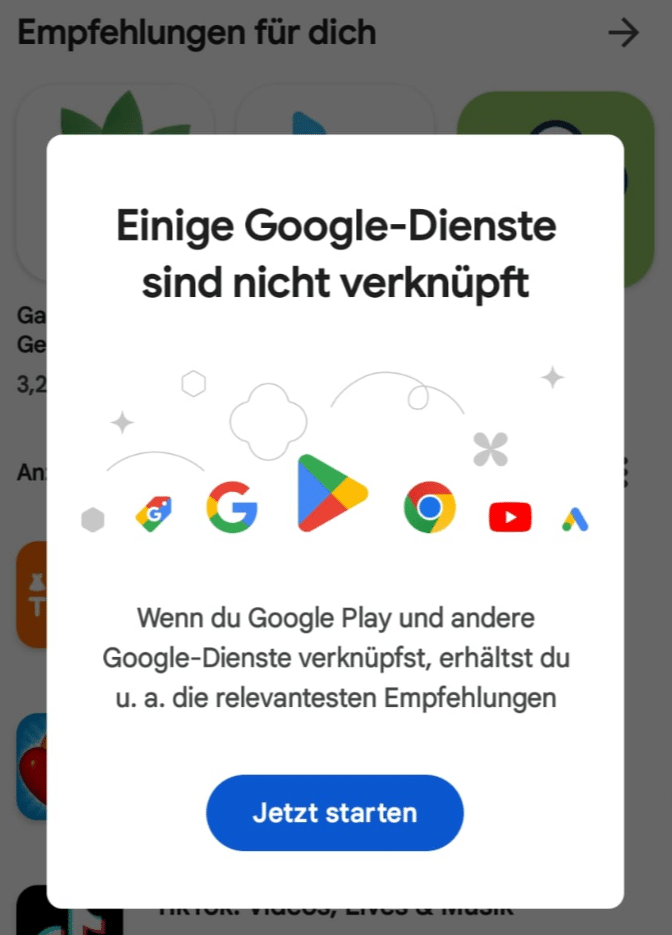In the last few days, numerous users of Google services experienced a surprise: when opening Google Maps in the browser or the Google Play Store on Android smartphones, they were confronted with a puzzling message - "Some Google services are not linked". This news causes confusion, but the explanation lies in recent regulatory changes in Europe.

The news is a direct result of the Digital Markets Act ( DMA ), which came into force in the European Union at the beginning of March. The aim of the DMA is to limit the market power of large IT companies such as Google, Meta and Microsoft by making it more difficult to exchange user data between different services. This is intended to offer smaller companies better competitive opportunities and give users more control over their data.
The Digital Markets Act and its implications
The DMA aims to limit the dominant position of large platforms by regulating data exchange between their services. On the one hand, this means more data protection and freedom of choice for users. On the other hand, they could have to forego the usual convenience, such as the seamless use of Google Maps directly from Google search. The new pop-up message from Google is an attempt to force users to agree to the data exchange in order to be able to continue to offer the usual services in full.
Users have the choice
Google assures that users do not have to make a decision immediately and offers the option to adjust the settings later . However, anyone who does not agree to the linking of various services may have to forego some conveniences. At the same time, the EU Commission has expressed its disappointment with the implementation of the DMA by some companies so far and has initiated investigations.
Privacy vs. convenience
The core question is why Google relies on linking data from different services. The group sees this as an opportunity to offer personalized advertising based on precise user profiles. At the same time, Google offers users ways to protect their privacy, for example by deactivating the storage of movement data or search histories.
Questions and answers about “Google services”:
Question 1: Why does the message “Some Google services are not linked” appear?
Answer 1: The news is a consequence of the Digital Markets Act that came into force in the EU, which regulates the exchange of user data between various services from large IT companies.
Question 2: What does the Digital Markets Act aim to achieve?
Answer 2: The DMA is intended to limit the market power of large platforms, offer smaller companies better competitive opportunities and strengthen data protection and freedom of choice for users.
Question 3: Do I have to reply to the Google message immediately?
Answer 3: No, Google offers the option to make the decision at a later date or to adjust the settings individually.
Question 4: What happens if I don't give my consent to linking?
Answer 4: Denial may lead to restrictions in the use of certain services as the seamless connection between various Google services may be impaired.
Question 5: Can I protect my data and privacy on Google?
Answer 5: Yes, Google offers settings that allow users to deactivate the storage of movement data, search histories and other information.
Conclusion
The introduction of the Digital Markets Act in the EU has caused confusion for many Google users. The new pop-up message “Some Google services are not linked” presents users with a choice between privacy and convenience. While the DMA aims to limit the market power of large platforms and promote competition, users must decide to what extent they are willing to forego certain conveniences in exchange for more data protection. However, Google also offers options to protect privacy and still benefit from the services. It remains to be seen how the implementation of the DMA will continue to shape Europe's digital landscape.
To stay informed, we recommend registering for the Mimikama newsletter at https://www.mimikama.org/mimikama-newsletter/ and our online lectures and workshops at https://www.mimikama.education/ online-lecture-by-mimikama/ to attend.
Also read:
Notes:
1) This content reflects the current state of affairs at the time of publication. The reproduction of individual images, screenshots, embeds or video sequences serves to discuss the topic. 2) Individual contributions were created through the use of machine assistance and were carefully checked by the Mimikama editorial team before publication. ( Reason )

